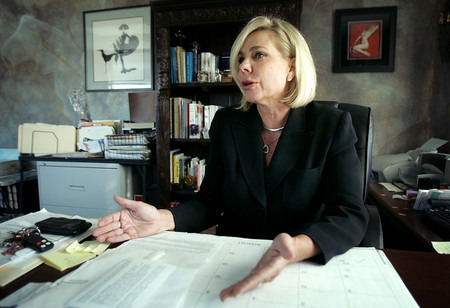Medical spas challenging rules on who gives shots
Your emergency regulations don't apply, Gov. Jim Gibbons.
That was the message from attorney Jacob Hafter, who said confusion over whether medical assistants can give flu shots is more than a judge can clear up at next week's hearing on a temporary restraining order.
Hafter, who represents several owners of medical spas and filed the motion for the restraining order, said it would take a special session of the Legislature to amend the 30-year-old Nevada statute that prohibits medical assistants from administering injections including flu shots and Botox, the anti-wrinkle drug.
"You can't have a regulation that allows something that's prohibited by a statute," Hafter said. "Regulations can only be put in words that comply with the statute."
Gibbons spokesman Dan Burns said that if the medical board believes an emergency exists, it is allowed to change medical regulations for 120 days, during which a period of public hearings on the issue would be held.
Burns said he didn't know whether the regulation is legally invalid if it conflicts with the statute.
"The governor's primary concern is the health and safety of the people of Nevada," Burns said. "He relies on the medical board to determine the issues that need to be dealt with right away."
The emergency regulations permitting medical assistants to administer flu shots and other vaccines -- which conflict with rarely enforced regulations prohibiting them from giving any injections -- were approved by the Nevada State Board of Medical Examiners and signed by Gibbons at an emergency session Friday.
But Hafter's motion for a restraining order has delayed the proceedings.
Hafter said there may be bias on the board, referring to board member Dr. Benjamin Rodriguez, a plastic surgeon.
Hafter said plastic surgeons are losing business to medical spas, which routinely had medical assistants giving Botox and other types of injections.
Rodriguez, who used medical assistants in his office to administer Botox to his patients, recused himself from voting on the emergency regulations.
But Senate Majority Leader Steven Horsford on Tuesday called on Gibbons to ask Rodriguez to resign. Gibbons reappointed Rodriguez to a four-year term on the medical board two weeks ago.
Gibbons has no intention of complying with Horsford's request, according to Burns.
Horsford, D-Las Vegas, said in a letter to the governor that Rodriguez "violated the very laws he is expected to enforce as a member of the State Board of Medical Examiners, and for that reason alone should have his appointment rescinded."
Burns said Gibbons does not have the legal authority to dismiss Rodriguez. Gibbons asked three board members last year to resign in the wake of the outbreak of hepatitis C in Las Vegas. All refused.
The governor eventually relented in his attempt to get members to quit.
Rodriguez allowed medical assistants to give Botox shots based on comments by Tony Clark, the board's former executive director, Burns said.
"At the time Dr. Rodriguez was having medical assistants do procedures, the executive director said it was OK," Burns said.
Horsford said state licensing boards are to protect the public, and "we cannot overlook board members that tacitly condone illegal conduct."
Noelle Rodriguez, the doctor's daughter and spokeswoman, said her father "has no intention of quitting and he thinks Horsford is a little misinformed."
She said her father and most other doctors in Nevada were unaware of the law preventing medical assistants from giving injections.
Hafter said that if medical officials are "going after the (medical assistants who inject Botox), that's inappropriate, capricious targeting of one class. And I'm openly calling for (medical board executive director) Louis Ling's resignation for failing to regulate the industry."
Ling, who wrote the new regulations, has previously said he learned in August from Rodriguez and other physicians that some doctors were allowing medical assistants to inject Botox and other cosmetic fillers under their licenses at spas with no supervision.
Hafter also said some members of the public weren't given a chance to speak at the session, including one of his clients, which is a violation of the open meeting law.
Clark County District Judge Kathleen Delaney ordered a Sept. 29 hearing on the case to determine whether the open meeting law was violated and if the temporary restraining order will be amended into a preliminary injunction. A temporary restraining order is valid for only 15 days.
About 10 people had testified Friday before several medical board members said they had lunch engagements approaching. The vote was taken because the board was in danger of losing its quorum. Three people were denied the chance to comment before the action.
On Friday, Chief Deputy Attorney General Christine Guerci-Nyhus said the board could vote on the regulation if the three people denied the chance to speak were allowed to testify afterward. Ling told the Review-Journal after the hearing that the board isn't even required to take public comment before adopting emergency regulations.
Ling said Tuesday that he couldn't comment on the issue because of the litigation and that the medical board will make its arguments at the hearing.
"The judge did what she did. We have to do what we have to do," Ling said.
Until the hearing, existing law remains in effect, said Edie Cartwright, a spokeswoman for the state attorney general's office.
"My understanding is that it's reset to the law as it was, not necessarily how it was practiced," Cartwright said.
Hafter contends the language of the law never has prohibited medical assistants from administering injections, according to his reading.
If it does, he said, he would like to see public officials in action.
"Let them start prosecuting everybody," he said. "I want to see them bring charges against every single medical practice that's doing it."
Contact reporter Mike Blasky at mblasky@ reviewjournal.com or 702-383-0283. Contact Review-Journal Capital Bureau Chief Ed Vogel at evogel@reviewjournal.com or 775-687-3901.

















